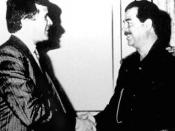President Bush recently announced a strategic global doctrine that justifies a "preemptive US strike" against any regime that is thought to possess weapons of mass destruction, but the CIA released a report that provided clear evidence that Iraq possesses less of a threat to the world now than at any other time in the past decade (Scheer par. 1). The report concludes that Iraq's chemical weapons "capability was reduced during the UNSCOM [United Nations Special Commission] inspection and is probably more limited now than it was at the time of the Gulf War" (Scheer par. 7). The creation of the chemical and biological weapons that existed before the UNSCOM inspection happened to be greatly facilitated by U.S. company's sale of hardware to Iraq - sales that were approved during the 1980s, when the administrations of Ronald Reagon and George H.W. Bush both sided with Iraq in its war with Iran.
The report also notes that all cases that Iraq used chemical weapons occurred on or before March 1998, primarily against Iranian troops in a war secretly supported by the United States, and that neither chemical nor biological weapons were used against the United States during or after the Gulf War. The report also states that the CIA has no evidence that Iraq possesses nuclear weapons. (Ditmars par. 11). Bush retorted to that finding by saying, "Although Saddam probably does not yet have weapons or sufficient material to make any, he remains intent on acquiring them (Scheer par. 3). So if Bush's emphasis is on intent, not capability, there are dozens nations that the statement could be applied to, many of them run by dictators as malicious as Hussein, but they are not targets of Bush's wrath. Also, if Iraq were not to allow additional inspections, the CIA report...



Fantastic!
i totlally agree,its so nice to find someone inteligent enough to look past the propagander machine. Ive got a couple of ideas that could strenthen your case further: War on iraq is a diversionary tactic for somthing else, i bet everyone in america has forgotten by now that bush was not legally elected- he actually had the minority in florida, but due to a recount BY HIS BROTHER! he got in.scary.
Also in proof that he is after saddams oil, i live in london, where we get theatened by the I.R.A (we treated the irish pretty appalingly for years) as yet, there are no plans to bomb northern island, which has got nuclear capability (power stations every where!) or the E.T.A terrorists in spain. Why not? because what could bush do with a load of plundered potatoes and olives? How will that profit america?.
The last and most scary thing is that america is almost certainly in breach of the very contract it is using as an excuse- In a programme shown here(i think its been banned in america)a journalist gained acsess to the american bases in england posing as a tourist. He then found doucuments detailing the various chemical wepons research occuring within the base.Americas loophole is that they are allowed to produce chemical and biological weapons for domestic purposes i.e the police. but he found evidence to say they were being loaded into standard issue missile shells! anyway fab essay, keep up the good work!
4 out of 4 people found this comment useful.